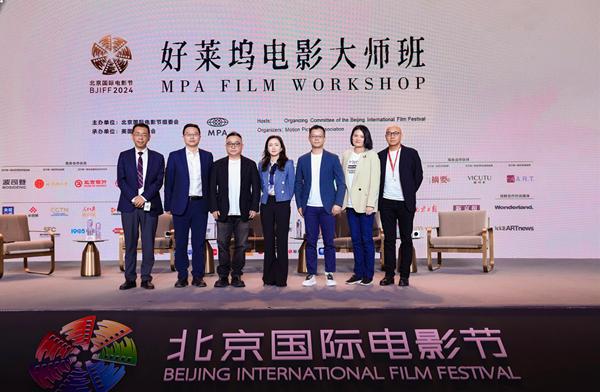Film industry elites gathered on April 22 during a workshop at the 14th Beijing International Film Festival to discuss how to better develop intellectual properties and share insights on how to reach broader global audiences.

Film executives pose for a group photo at the end of the MPA Film Workshop held during the 14th Beijing International Film Festival in Beijing, April 22, 2024. [Photo courtesy of BJIFF Organizing Committee]
William Feng, head of Greater China and vice president of Asia Pacific for the Motion Picture Association (MPA), stressed the importance of international cooperation at the MPA Film Workshop, emphasizing the need for Chinese filmmakers to create higher quality and more diverse original content while still respecting creative principles and learning from the international film industries' experiences with development. "The primary task in promoting high-quality development of Chinese cinema is to ensure the continuous and stable output of excellent content," he said.
Taking film remakes as an example, he pointed out that remakes are not merely cultural replication but a form of cultural exchange and integration, which aids in mutual understanding and sharing of experiences between different countries and ethnicities.
In recent years, there has been notable successes, such as the recent releases of "YOLO," a Chinese reproduction of Japan's "100 Yen Love," and "Lost in the Stars," an adaptation of the Soviet comedy film "A Trap for a Lonely Man." Besides Chinese adaptations of foreign films, remakes of Chinese originals aboard are also in the works, marking significant achievements in the international expansion of Chinese cinema. Earlier this year, Sony Pictures announced it had acquired the rights for an English-language adaptation of Jia Ling's dramedy blockbuster, "Hi, Mom," inviting her to Hollywood to serve as executive producer on the project. However, some audiences are not fans of remakes and believe they reflect a lack of originality.
Catherine Ying, vice president of CMC Inc. and president of CMC Pictures and Pearl Studio, believes that remakes are a special and challenging film genre. "A good remake is not simply a copy; they are often more difficult than original works on many levels because they require creators to maintain the spirit of the original while also conducting in-depth localization adaptations."
Regarding Sino-foreign co-productions, Ying believes that co-produced films must first achieve commercial success to reach a broad global audience and thus exert their influence. She emphasizes that co-productions should present narratives and structures that are acceptable and identifiable to a global audience.
Huang Dai, senior vice president of TV Distribution at Sony Pictures Entertainment Greater China, highlighted the importance of identifying target audiences and advocated for innovation when adapting IPs domestically and internationally. She proposed that it is possible to tell Chinese stories from a perspective and story pace that overseas audiences can also understand and find relatable.
Jerry Ye, senior vice president of iQiyi, believes that originality is an urgent issue in the current film industry and proposes that cultivating more mature original creators is key to industry development. He also suggests transcending the concept of IPs and striving to create classics, which involves deeper pursuits in artistic creation, such as dramatic logic, exploration of human nature and literary value. "These elements together constitute the rich connotations of the work, enabling it to transcend cultural and temporal boundaries and resonate with a wide audience," he said.
Li Ning, senior vice president of New Classics Media Group and CEO of New Classics Pictures under China Literature Limited, pointed out that the deep development of IPs is an endless process. He also noted that after experiencing the difficulties of the pandemic, the film industry is now in a vibrant recovery phase. Creators, investors and participants at every level of the film industry need to unleash their passion while also adhering to creative principles and market operations to ensure the healthy development of the industry.
With the support of the China Film Administration and related government departments, MPA member companies have provided significant platforms for training Chinese film talent and facilitating international development through various initiatives for years. These actions will continue as two winners from the collaborative categories between MPA and the film festival's The Project Pitches section will be given the opportunity to both study and partake in dialogue with American studios and filmmakers for a week.






